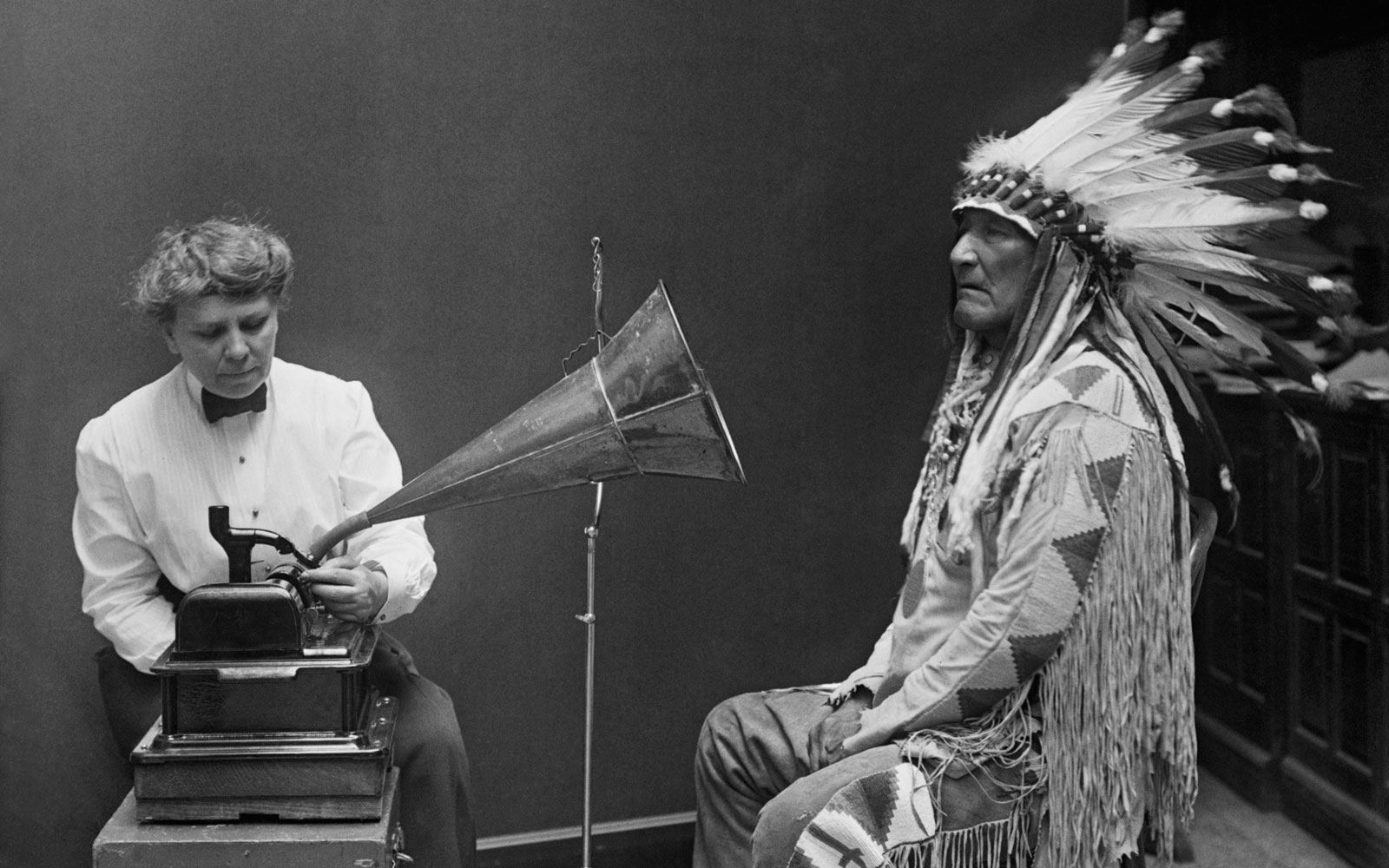
Frances Densmore recording Blackfoot chief Mountain Chief for the Bureau of American Ethnology, 1916 | Library of Congress | Public Domain
The revival of podcasts, the success of voice messaging on WhatsApp, and the ability to talk to the machines around us reveal the increasing importance of the voice in our culture. At the same time, the internet has proven a great ally of sound archives, allowing their documentary side to develop and offer more ensemble views of reality. At this moment of multiple voices, literature also lays claim to being a space in which to read them, listen to them, and feel them.
It happens often, in these early years of the new century. In trailblazing books like Alberto Fuguet’s Missing (una investigación) (Alfaguara, 2011), Martín Caparrós’s El interior (Malpaso, 2014), and Delphine de Vigan’s D’après une histoire vraie (Jean-Claude Lattes, 2015), compact prose suddenly disintegrates, dissolves, and a voice in fragments emerges. When Fuguet finally finds the missing uncle he has tracked down over the past 157 pages, he allows him to speak in a poetic monologue for a similar amount (until page 336). In his chapter on “Pueblo Liebig”, Caparrós experiments with verse to reproduce the voice of one of the characters, Don Balbino, which sometimes merges with his own. In D’après une histoire vraie, when the novel that starts out as a reflection on fiction turns into a free adaptation of Stephen King’s Misery (in other words, a horror novel), the protagonist decides to take audio notes on her mobile phone, so that paragraphs give way to disjointed sentences, words spoken by a voice in encroaching darkness.
In a world of communications dominated by writing (e-mails, chats, tweets, whatsapps, reports, posts) and audiovisual formats (documentaries, series, professional and domestic video, films, ads, trailers, video clips), the voice appears to be making a comeback. A possible chink in the visual dominion opened up in 2013, when WhatsApp introduced the option of voice messaging. Since then, its use has continued to grow among its billion users. At the same time – as the film Her portrayed so well –, it has become increasingly common to talk to the machines that surround us. Programmes such as Google Home’s voice assistant and Amazon Echo don’t just listen and obey, they also record everything we say. The internet doesn’t just remember all our texts and images now, it has also started to save our voices. This development is taking place in a context in which radio has not lost any ground as a mass medium, while at the same time sound is increasingly important in the spheres of art and literature. Think about Radio Ambulante, for example, an oral histories platform consisting of podcasts or what they call “episodes”. Or Serial, the podcast true story novel in instalments that has become a mass phenomenon. Or think about the current spotlight on Hans Ulrich Obrist, the art curator who has systematically interviewed curators and artists for the past twenty-five years, sometimes for magazines, sometimes as public performance, always fully conscious of the nature of the interview as an artistic practice and a document. A voice integrated into a system of voices. In A Brief History of Curating, Obrist approaches the field of oral history: “Because of this extreme lack of documentation relating to exhibitions, I decided it was urgent to start recording an oral history.”
The 2015 Nobel Prize in Literature to Svetlana Alexievich recognised this discipline – which is usually linked to academic practices – as a field of artistic endeavour. In the preface to Secondhand Time: The Last of the Soviets (Random House, 2016), Alexievich explains her decision to use a hybridisation of oral history and classic tragedy in terms of another great vector of our time: emotion. “History is concerned solely with the facts: emotions are outside of its realm of interest,” she writes, “but I look at the world as a writer and not a historian.” And in War’s Unwomanly Face (Raduga, 1987), she adds: “I don’t write the history of war, but the history of feelings. I am a historian of the soul.” Her own voice disappears. Her books are archipelagos or constellations of the voices of others. Monologues and choral voices prevail in them, although they sometimes include dialogues. When Alexievich speaks, she almost always does so in the form of an interview (with a historian, with a censor, with herself) or an extract from a diary (or a notebook), clearly signalling the mediating distance and her secondary role in a project in which the protagonists are the survivors of the great tragedies of Soviet history. Although authorship is of course present in every word, in every ellipsis, in the assembling of this complex artefact that works with the precision of a clock: “I listen when they speak… I listen when they are silent… For me both words and silence are the text.”
Alexievich’s books are the ultimate expression of the ongoing importance of the voice in the transition from the twentieth century to the twenty-first. In an age like ours, in which everything can be archived – from eye-witness accounts of the Nazi holocaust and the voices of more recent massacres, to digitalised versions of recordings made on obsolete media, and our own day-to-day monologues in the black mirror of Siri –, an age in which the voices that reach us, through music, radio and websites, are above all digitalised, Alexievich and other writers and artists remind us that we can also listen through reading, both in print and on the screen. And most importantly, that listening can be synonymous with feeling. The audiobook market is growing. The important thing is to keep reading, one way or another.






Leave a comment